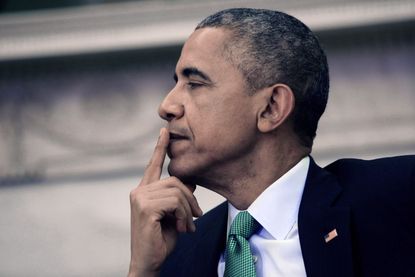Obama's real failure on Iran
For Obama's grand strategy to succeed, the president would need to be a highly skilled statesman. But The One isn't one.


Conservatives love to direct ire at President Obama's domestic agenda, particularly his stated goal of "fundamentally transforming" America — halting and amateurish as his progress might be.
Fewer critics on the right have surmised that the president may have the same degree of ambition when it comes to the Middle East. But for a small group of observers, the only way to make sense of the administration's largely reactive and scattershot foreign policy is to see it as the tip of a radical iceberg. Obama, they say, aims to transform the Muslim world by replacing the Saudis with the Iranians as the Mideast's top dog.
This thesis is compelling, if unproven. But the reality is that if Obama has such a plan, he is failing to execute it — an even bigger problem than the alleged strategy itself.
Subscribe to The Week
Escape your echo chamber. Get the facts behind the news, plus analysis from multiple perspectives.

Sign up for The Week's Free Newsletters
From our morning news briefing to a weekly Good News Newsletter, get the best of The Week delivered directly to your inbox.
From our morning news briefing to a weekly Good News Newsletter, get the best of The Week delivered directly to your inbox.
In a sweeping essay, former NSC heavyweight Michael Doran recently made the case that the administration's Mideast moves reveal the grand strategy Obama is often said to lack. In proactive and reactive ways, the president has shifted America's main constructive relationship away from the Sunni-dominated Arab nations, especially in the gulf — and toward the mullahs in Tehran.
The most important thing about Obama's grand pro-Iran strategy, according to Doran and his supporters, is its secrecy. To dramatize his case, Doran cites a top Obama aide, quoted by David E. Sanger in his book Confront and Conceal: Obama's Secret Wars and Surprising Use of American Power. In 2011, the aide told Sanger "there were more meetings on Iran than there were on Iraq, Afghanistan, and China in year one. It was the thing we spent the most time on and talked about the least in public."
Obama's alleged Iran plan had to be secret, the argument goes, because so few allies and constituents would support it.
But for years, those opposed to a new Iranian-dominated order in the Mideast have come to believe they could see right through to Obama's true intentions. The Saudis have watched all but helplessly as Obama has allowed Iran's regional influence to spread and take root, from Syria to Iraq to Yemen and beyond. And here at home, Obama's most vociferous Republican critics have slammed the president for weakening our Arab allies and Israel to nobody's benefit but Iran's.
For Obama's harshest critics on Iran, the secret strategy — assuming it exists — has long been seen as an open secret.
But the central problem is not the concept of an Iran-led Mideast, but the execution. Despite Iran's clear animosity toward America, the Saudis have been horrendous allies — all but unpunishable despite 9/11 and its aftermath, the kingdom's abysmal human rights record, its shadowy relationship with terrorists, and its extraordinarily punitive and reactionary response to the so-called Arab Spring. Unlike Iran, Saudi Arabia lacks the kind of middle tier of society that lends durability and order to a regime. Iran's progress toward a nuclear weapon may be a ticking time bomb. But, politically speaking, the Saudis themselves are a ticking time bomb, too. Conceptually, finding a way to peacefully reorder the Mideast under Iranian dominance is a better idea than managing its slide into violence under bankrupt Saudi leadership.
But this concept, brilliant as it may be, requires genius in its execution — a visionary understanding of statecraft, civilizations, and the painfully slow workings of time, culture, and authority. This the administration blatantly lacks. Sadly, such an understanding is all but impossible to learn on the job.
To wind up with a stable, peaceful, and influential Iran — one which we can successfully incentivize and disincentivize — we need to embark on a massive geopolitical program with clear and strong support at home and abroad. At a minimum, we need confident buy-in from Europe and from the American people. It would be nice to have it from Israel and at least some of our Arab allies as well.
Obama has none of these things. His secrecy has been paired with a strange mix of sloth and haste — dragging out negotiations with Iran on the one hand, while, on the other, neglecting negotiations with those whose support he needs to succeed. He has completely lost Republicans, some of whom have had it with the Saudis and many of whom would prefer to leave the Mideast to its own fate so long as Israel is spared. He has let our relationships with the Sunni Arab states slip into disarray and hypocrisy. He has even let down Europe: The same France that didn't want to rush toward war with Iraq now opposes his rush toward peace with Iran.
That's why his administration is scrambling now to unleash an aggressive, full-court PR campaign aimed at every powerful skeptic in town. It hopes to do in a few weeks what needs many years to accomplish. Forging ahead without any strong backing, at home or abroad, only made sense if Obama was convinced that the alternative to his plan was disaster. But disaster could come anyway. And an alternative approach might well head it off. It is too late to convince the world to put its faith in this administration.
Regardless of how grand his vision of a new Mideast may be, Obama is moving too fast and too arrogantly to bring it to fruition. Perhaps he could have made more headway had he not devoted so much energy in his first term to pursuing grand transformations at home. Regardless, everyone knows the clock is ticking on his administration. And nobody really expects what he does in the Mideast to last.
As essential to good statecraft as grand strategies may be, this president is not the first leader to discover just how insufficient they can become.
Create an account with the same email registered to your subscription to unlock access.
Sign up for Today's Best Articles in your inbox
A free daily email with the biggest news stories of the day – and the best features from TheWeek.com
James Poulos is a contributing editor at National Affairs and the author of The Art of Being Free, out January 17 from St. Martin's Press. He has written on freedom and the politics of the future for publications ranging from The Federalist to Foreign Policy and from Good to Vice. He fronts the band Night Years in Los Angeles, where he lives with his son.
-
 Arizona court reinstates 1864 abortion ban
Arizona court reinstates 1864 abortion banSpeed Read The law makes all abortions illegal in the state except to save the mother's life
By Rafi Schwartz, The Week US Published
-
 Trump, billions richer, is selling Bibles
Trump, billions richer, is selling BiblesSpeed Read The former president is hawking a $60 "God Bless the USA Bible"
By Peter Weber, The Week US Published
-
 The debate about Biden's age and mental fitness
The debate about Biden's age and mental fitnessIn Depth Some critics argue Biden is too old to run again. Does the argument have merit?
By Grayson Quay Published
-
 How would a second Trump presidency affect Britain?
How would a second Trump presidency affect Britain?Today's Big Question Re-election of Republican frontrunner could threaten UK security, warns former head of secret service
By Harriet Marsden, The Week UK Published
-
 'Rwanda plan is less a deterrent and more a bluff'
'Rwanda plan is less a deterrent and more a bluff'Instant Opinion Opinion, comment and editorials of the day
By The Week UK Published
-
 Henry Kissinger dies aged 100: a complicated legacy?
Henry Kissinger dies aged 100: a complicated legacy?Talking Point Top US diplomat and Nobel Peace Prize winner remembered as both foreign policy genius and war criminal
By Harriet Marsden, The Week UK Last updated
-
 Trump’s rhetoric: a shift to 'straight-up Nazi talk'
Trump’s rhetoric: a shift to 'straight-up Nazi talk'Why everyone's talking about Would-be president's sinister language is backed by an incendiary policy agenda, say commentators
By The Week UK Published
-
 More covfefe: is the world ready for a second Donald Trump presidency?
More covfefe: is the world ready for a second Donald Trump presidency?Today's Big Question Republican's re-election would be a 'nightmare' scenario for Europe, Ukraine and the West
By Sorcha Bradley, The Week UK Published


